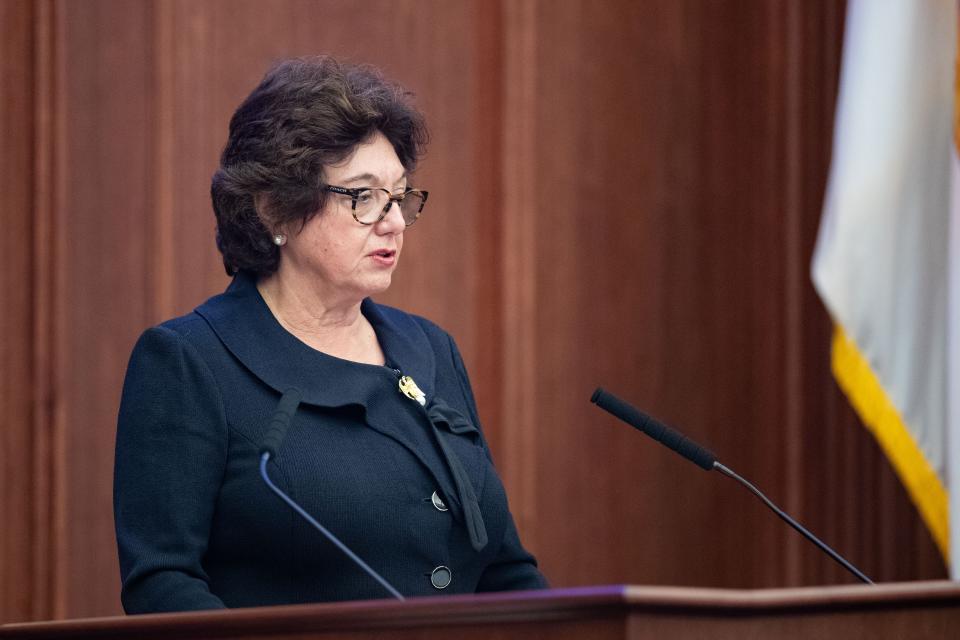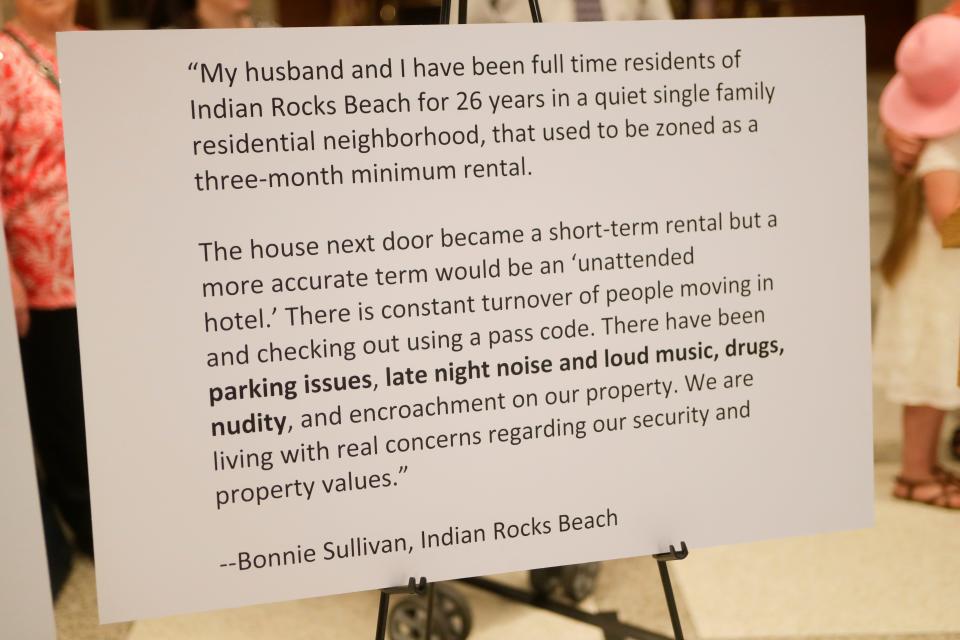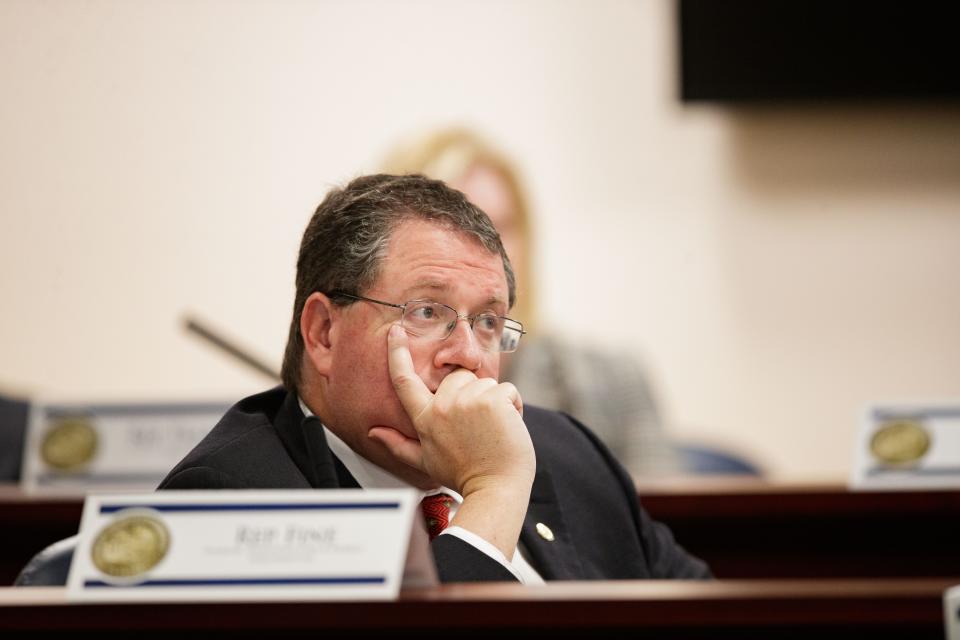Florida Gov. DeSantis vetoes vacation rental bill that gave state more authority
- Oops!Something went wrong.Please try again later.
Gov. Ron DeSantis sided with scores of Florida city and county governments and vetoed a measure that would have erased local regulation of vacation rental properties and turned power over to the state.
It was a rare move for a Republican governor who usually embraces top-down management, having enacted a host of measures stripping regulatory authority from local governments while enhancing state authority.
In his veto letter, DeSantis said he rejected the bill's approach because vacation rental markets "are far from uniform across the various regions of the state."
"Going forward, I encourage the Florida Legislature and all key stakeholders to work together, with the understanding that vacation rentals should not be approached as a one-size-fits-all issue," DeSantis wrote.
The vacation rental measure proved one of the most controversial bill's of the 2024 session, drawing opposition from some key conservative members, although it had been a priority of Senate President Kathleen Passidomo, R-Naples.

The legislation (SB 280) would have wiped out city and county regulations approved since 2016 over vacation rentals. Local governments, though, could still respond to noise and safety concerns involving vacation properties under the legislation.
But in allowing ordinances enacted before 2016 to stand, only one county was to be shielded – Flagler, home to House Speaker Paul Renner, R-Palm Coast. The exception raised questions about whether the House leader was looking to dodge controversy expected to be spawned by a state takeover of most regulations.
Across Florida, many local government officials joined with vacation rental management companies and the Florida Realtors in blasting the legislation. They decried the idea of losing authority to the state over vacation rentals, which are prolific in most coastal communities.
Vacation rentals are often blamed for disrupting neighborhoods and reducing affordable housing in many areas. But plenty of Floridians in beach and college towns see renting out their places as a ready source of income.
The Senate sponsor of the legislation – Sen. Nick DiCeglie, R-Indian Rocks Beach – argued that his bill struck a correct balance. He also ridiculed local governments for being heavy-handed currently with their regulation of vacation rentals.
City officials in DiCeglie’s hometown were among those urging a DeSantis veto.
The Florida Department of Business and Professional Regulation, the state agency the legislation made responsible for overseeing vacation rentals, was to be given nine additional agents.
Still, critics mocked that increase in staff as woefully short of what’s needed.
There were just over 45,000 vacation rental condos and dwellings licensed with the state last year — a number seen as capturing only a small share of the rentals likely operating.
New statewide requirements that would have been created by the measure included overnight occupancy limits on vacation rentals, with a maximum two people per bedroom, plus an additional two in a common area.

Fines for rental violations were capped at $500 and DBPR would be charged with setting up a database for vacation rentals. The bill also required rentals to have a person ready to respond to complaints or emergencies and available by phone, 24-hours a day, seven days a week.
Advertising platforms, like Airbnb and Vrbo, would be doing the tax collecting for the counties, something they’re already doing in many locations
But the Florida Realtors Association urged its more than 238,000 members to lobby DeSantis to kill the bill. Cities and counties around the state also clamored for a DeSantis veto.
Still, the Florida Restaurant & Lodging Association President and CEO Carol Dover came out in support of the measure, saying, “while the bill is not perfect, it is a strong start.”
Lawmakers have been scrapping over vacation rentals for more than a decade, advancing policies that toggle between more state control and more hands-off. This year, it was the state’s turn to come out on top in the Legislature, although it proved divisive.
The legislation cleared the Senate 23-16 after getting through the House 60-51.
In a Florida Legislature where Republican supermajorities call the shots, the narrow divide made the vacation rentals bill one of the more bitterly fought measures of the session, which ended March 8.
Republican leaders pushed many bills this session that preempted local government authority, a move some cast as conservative lawmakers out to limit decision-making by more liberal-leaning cities and counties.
But the vacation rental preemption on cities and counties caused a rift among Republican lawmakers.

“We can’t screw this up,” Rep. Randy Fine, R-Palm Bay, told the House in debate on the measure. He was among several Republicans who joined a majority of Democrats voting against the measure.
Fine said the state’s takeover undermines regulatory decisions that should be made locally.
More: After DeSantis veto of Florida vacation rentals measure, handful of bills still remain
“When you have bought a home, you have a right to live in a residential neighborhood,” he said, warning that the legislation opened neighborhoods to threats stemming from newcomers living in short-term rentals, including sex offenders.
DeSantis kept quiet about the vacation rental proposal since lawmakers adjourned.
But the long, three-month delay in legislative leaders sending the governor the bill was a clear sign that it was controversial – and that DeSantis was likely needing extra time to decide its fate.
Four years ago, when lawmakers were advancing an earlier version of vacation rental legislation, DeSantis scoffed at the idea of the state assuming a lead regulatory role over cities and counties.
“We’re going to be in charge of this as a state?” DeSantis asked, during an exchange with reporters. “For us to be micromanaging vacation rentals, I’m not sure that’s the right thing to do."
John Kennedy is a reporter in the USA TODAY Network’s Florida Capital Bureau. He can be reached at jkennedy2@gannett.com, or on X at @JKennedyReport.
This article originally appeared on Tallahassee Democrat: DeSantis vetoes vacation rental bill that erased local regulations

